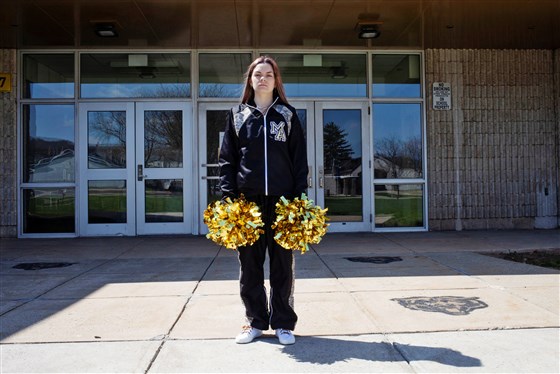
The Supreme Court seemed reluctant Wednesday to give schools wide latitude to punish students for things they say or post on social media when they’re off-campus.
The major test of student free speech involved a single social media post by a frustrated Pennsylvania ninth-grader.
When Brandi Levy discovered one Saturday that she didn’t make the varsity cheerleading team and would remain on the junior varsity squad, she lashed out on social media.
On Snapchat, she posted a photo of herself and a friend at a convenience store with their middle fingers raised. She repeatedly used a vulgar four-letter verb to write, “f— school f— softball f— cheer f— everything.”
“I wasn’t really thinking about it when I was making it. I was just upset at everything,” she said in an interview.
But another student found out about the message, took a screenshot, and showed it to her mother, who happened to be one of the school’s two cheerleading coaches. Brandi was suspended from the junior varsity team for her entire sophomore year.
She and her parents sued, and a federal appeals court ruled that because her message was posted off campus, she was beyond the reach of school authorities and for that reason could not be punished.
Several members of the Supreme Court said they thought the school went too far in suspending the student from an entire year of cheerleading.
“She blew off steam like millions of kids have when they’re disappointed about being cut from the high school team, or not being in the starting lineup, or not making all-league,” said Brett Kavanaugh. “It didn’t seem to me like the punishment was tailored to the offense.”
And the justices were concerned that giving schools authority to punish students for swearing off campus would go too far.
“I’m told by my clerks that how much you swear is a badge of honor,” said Sonia Sotomayor.
Stephen Breyer said if using swear words off-campus was considered disruptive, “My goodness, every school in the country would be doing nothing but punishing.”
But the justices were equally concerned that schools must be able to take action against such off-campus expression as bullying or e-mailing answers to test questions that would facilitate cheating.
David Cole of the ACLU, representing the Levy family, said schools already have authority to regulate that kind of expression, which he said is not protected by the First Amendment.
The Supreme Court’s landmark ruling on student expression came in 1969, when it said Ohio students could not be punished for wearing black armbands in school to protest the Vietnam war. In a widely quoted passage, the court said students and teachers alike do not “shed their constitutional rights to freedom of speech or expression at the schoolhouse gate.”
Student expression cannot be regulated, that ruling said, unless it would substantially disrupt the work and discipline of the school.
Brandi Levy and the Mahanoy Area School District disagreed on how that precedent applies to off-campus expression like hers in the internet age, and the court struggled Wednesday where to draw the line between expression that is disruptive on the one hand or merely offensive on the other.
“That’s a very nebulous line,” said Samuel Alito. “I’m concerned about the effect on freedom of speech.
The school said the spread of smartphones, social media, and the need for remote learning prompted by the Covid pandemic have blurred the line between what is on and off-campus. The prevalence of social media, the district said, has made it far easier for students’ off-campus messages to instantly reach a wide audience of classmates and dominate the on-campus environment.
The Biden administration sided with the school district. The Justice Department said the court’s previous cases on school speech dealt with the effects of a message on other students and school activities, not on the time or place where the messages were expressed.
Brandi Levy’s father, Larry, said in an interview that he hoped the court keeps off-campus speech off limits for the sake of free expression. Besides, he said in an interview, “that’s how parents learn about what’s going on in our children’s lives, through social media.”
The Supreme Court will issue its ruling by late June.







